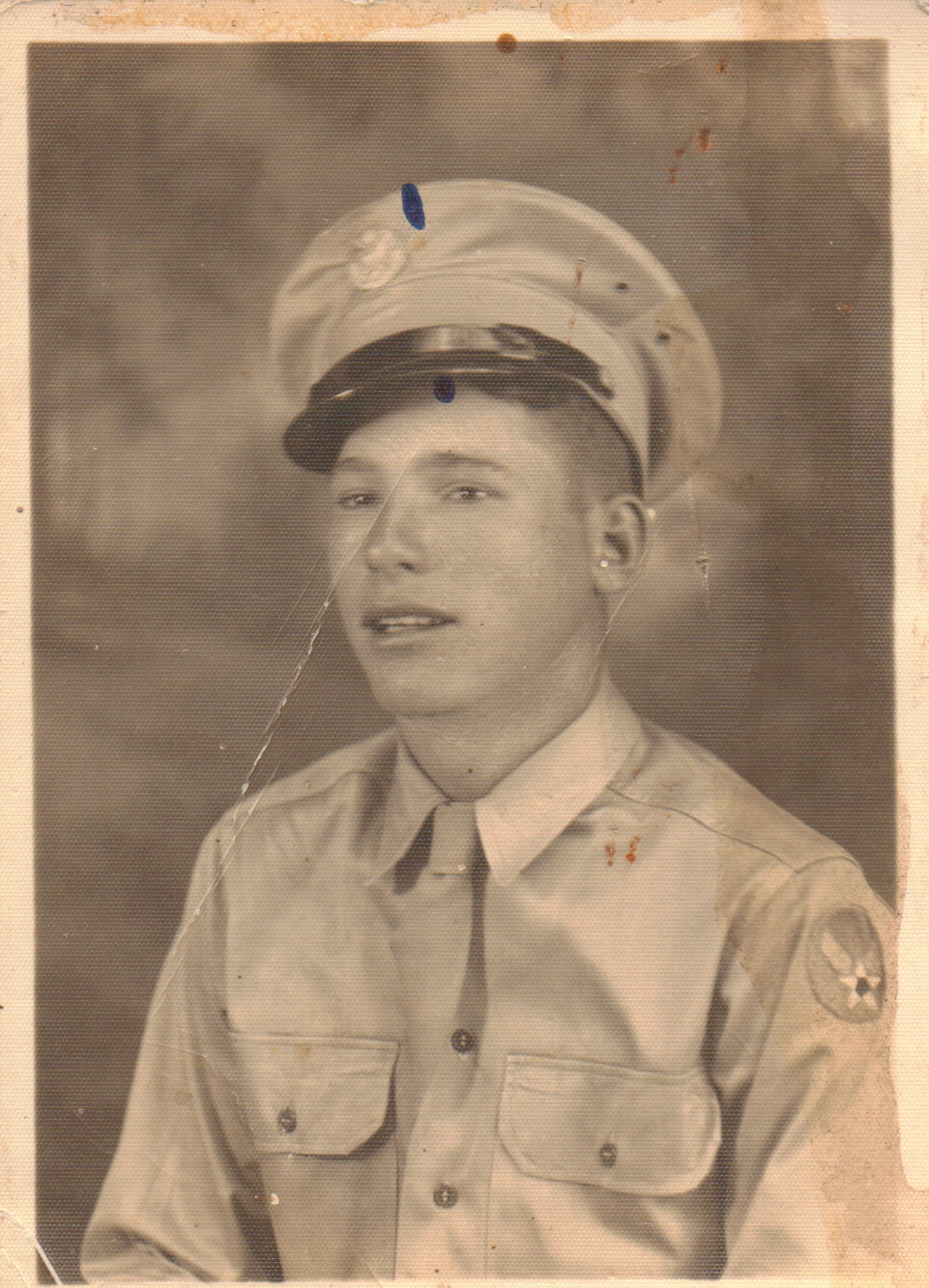TRANSCRIPTION
What are your earliest childhood memories?
Well I guess it would be that when we were kids me and my brother used to go down to the golf course. I don't remember the name of it but we used to go down and find the golf balls and the guy would come down and gives us a nickel a piece. Oh that was fun. Real fun. (Laughing)
What was it like to grow up during the depression?
Rough! Another words, we had nothin’ there was no money, dad had a route…he sold eggs, he sold butter, milk, and that’s about it and had a route about twice a week and he made oh about 13 to 15 dollars each route that’s about 30 dollars a week and that was a lot of money then…but really there was no money for nobody.
When you were a child where did you go to school?
WWWhite School then China Grove Elementary but halfway through the 7th I dropped out.
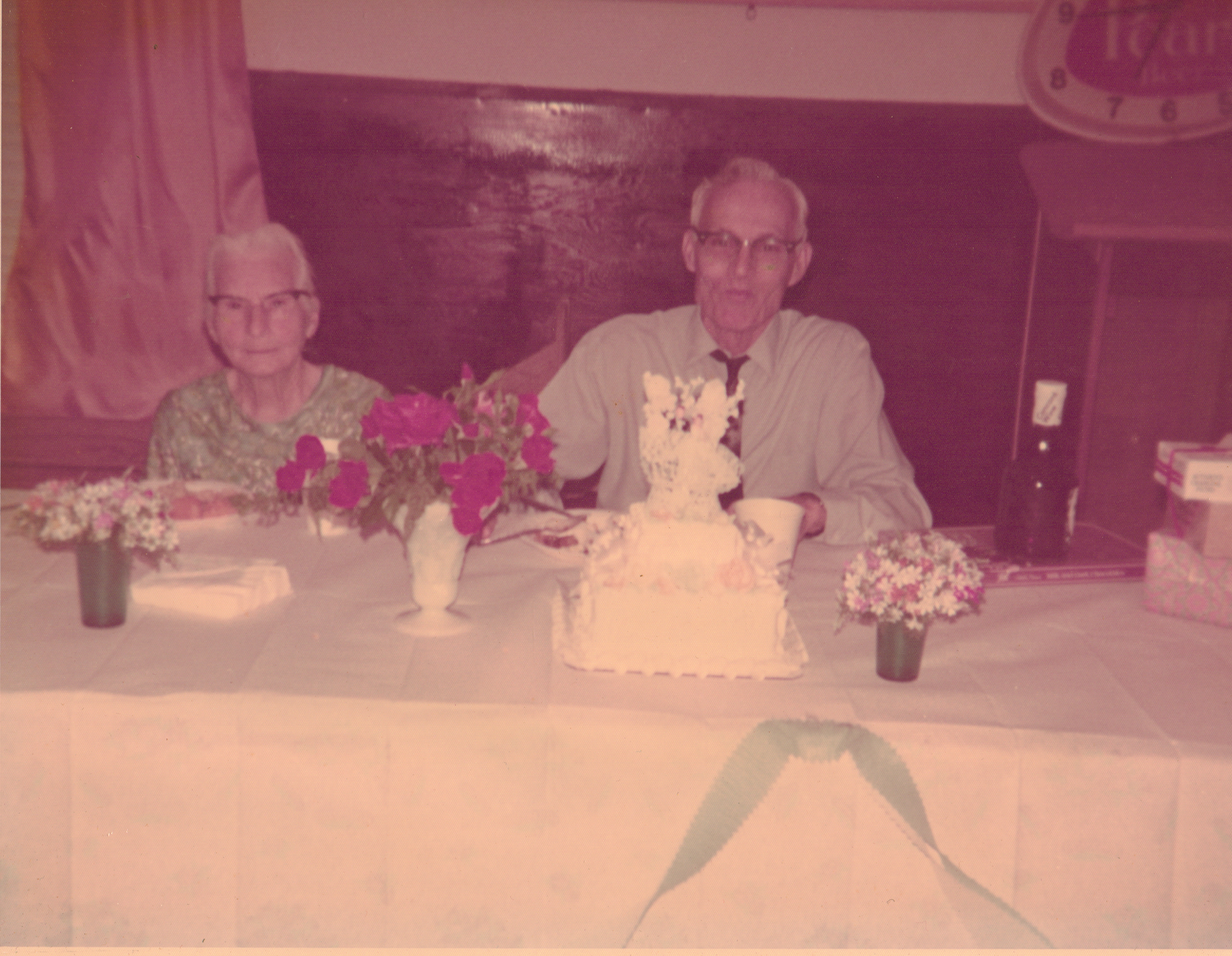
Why? The day?
Yeah I remember the day...his name was Kidwell he was the super and I fell back on some of my studies cause see daddy he had me always out of school bailin’ hay and pickin’ cotton and I would fall behind and catch up but he said next time you fall behind your gonna get a whippin’ and I said okay you try and well one day he said you up to studies and I said no and he walked off lookin' mad and so I walked out and walked home about half a mile or so and I told Daddy about it and he said no I need you here to work so that was the end of my education there…that was that. Later when I got back I had bought this barrack house and fixed it up and daddy he came by one day and wanted to buy it and so I sold it to him I see I didn't make no money on it...you know...Because boy I always felt sorry for momma she had 13 kids and she deserved a house she had a rough life and she was pitchin’ hay and, and worked the field...yeah I always felt sorry for momma.
Did ya’ll ever do things for fun when ya’ll were kids?
Oh yeah…hidin’ go seek on Saturday nights…the neighbors would come up and uh they’d bring food and pies and stuff but we’d play hidin’ seek and hide in the corn stalk…haha (lauging) but that was it…that was fun…you know you didn’t go nowhere, you didn’t go to the movies no, no…
If you went into your closet when you were a kid what would you see? What was in there?
Not much. You know momma patched our clothes. She had to you know what was you gonna do. Daddy soled our shoes, he was good at that. But really there was absolutely nothin’.
Did you have any toys, anything that was just yours?
The only thing I had was...when I was in St. Gerard’s…it's hard to think back like that…oh another words I had a confirmation in Catholic Church and the priest the gave me a silver dollar and I carried that silver dollar all through the war then when I came home, I always kept it put away but my niece used to always take me to the doctor and one day I asked her if she’d be interested in this thing I had and she said "what" and I showed it to her and gave it to her. But I took it with me to the war some days I put it in my locker but that was one thing I kept other than that nothing that I can remember.
How did you feel when you got drafted?
Oh, it didn’t matter to me I was ready we was on the farm you see…my dad, he went to work for Kelly Field so we took care of the farm us boys. No I was ready. Hey, I went down took the exam and I was gone. But I do remember the examination they give you oh man I just kept wonderin' what are you lookin' for...(laughing)... see before that I aint never seen a doctor. Then I went to six weeks schooling for chemical warfare. I don’t know where my certificate is and all that…it’s gone but anyway they broke us up and I went to Stinson Field cause that’s where they were gettin’ and that’s about it.
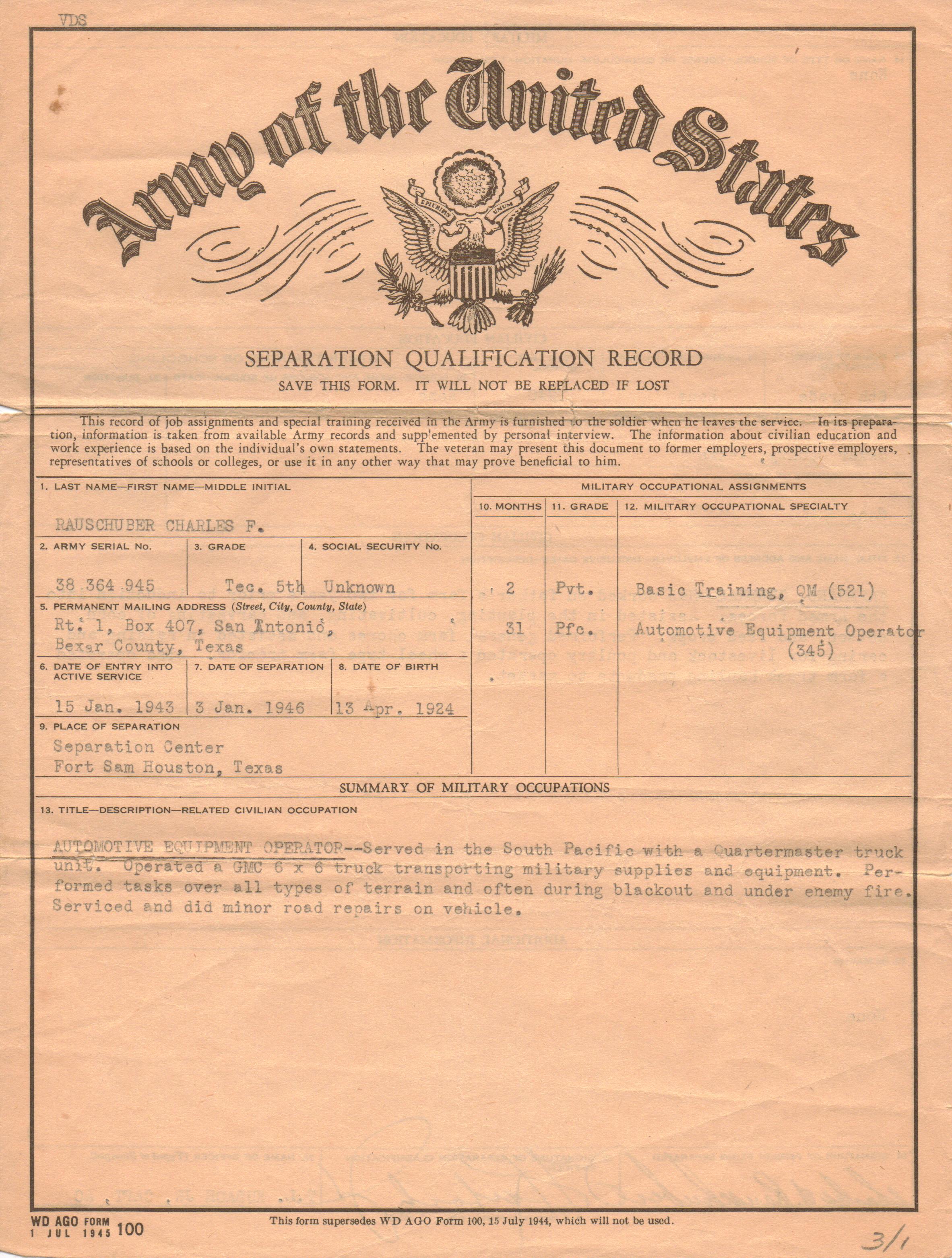
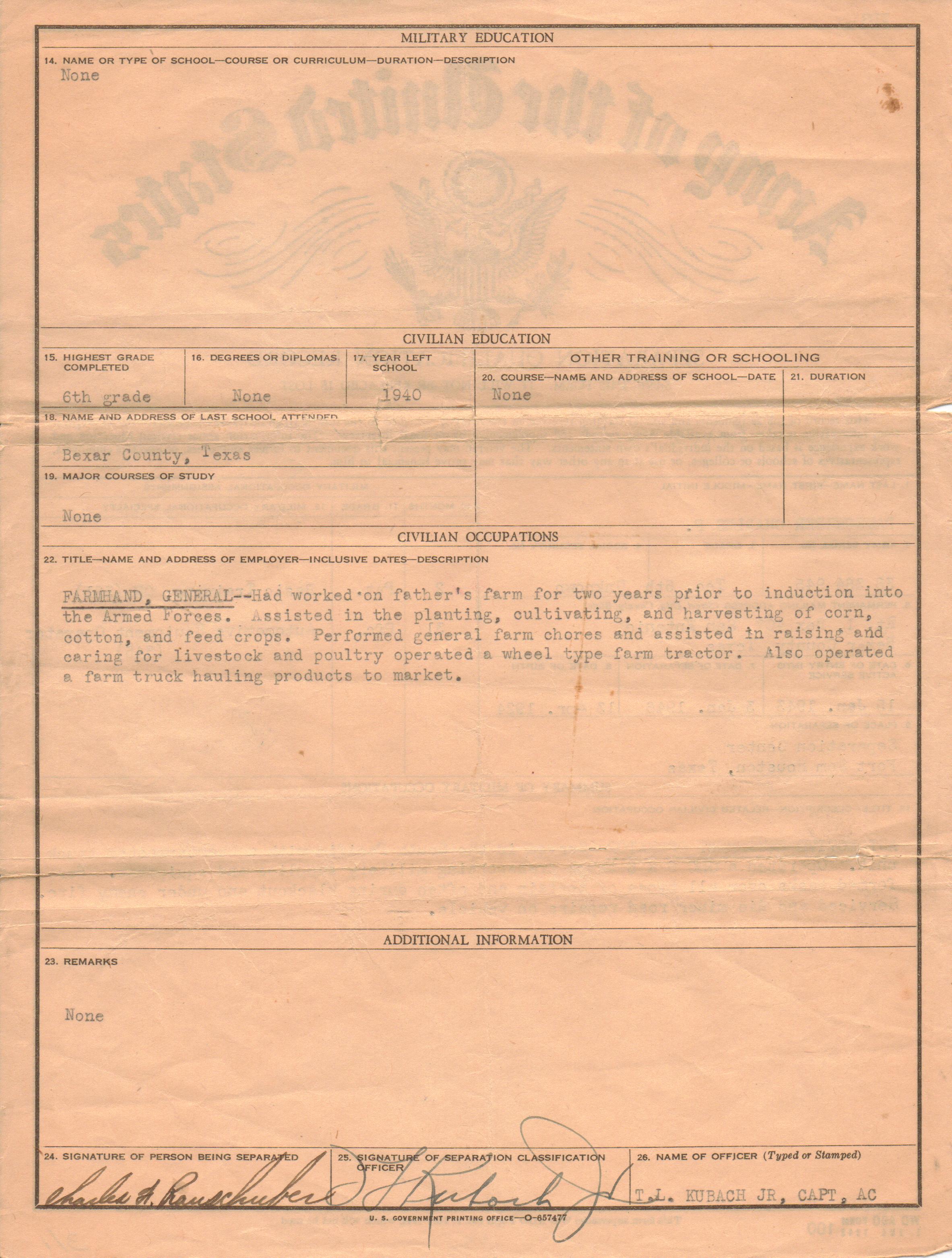
Where did you go, how did it work…you know the whole draft process?
They took you to...I don’t know what the building down town was called but we went in and they took your exam then you had 3 or 4 days that they gave you before they swore you in and that was it. But then I stayed in the San Antonio Area and then like I said I went to the chemical warfare school and then they sent me to Stinson Field where they had a truck outfit they was just gettin’ goin’ and we was there and we took convoys you know to south of San Antonio and I know how to drive a truck but they said no your gonna learn the Army way and I said that’s alright…hahaha. Well I was here about oh I guess maybe 4 months and then we was confined to the outfit at Stinson Field then we all got on a train and we all went to New York and there they had confinement to us there and we stayed 2 nights and the 3rd day we got the ferry to oh I can’t think of the name of that place so we went across the bay to somewhere then we got on a ship and went down from there to the Panama Canal and from there we went to Bridgemon, Australia and then from there we went to Townsville and we hauled supplies and personal down there then we were shipped out to the Philippines. I was in the invasion we were on the Hobart Baker then we went to New Guinea but I don’t know why they hauled us up there we were there like 3 or 4 days really I think we were waitin’ for the convoy. Then we went to there to the Philippines that date was October 20, 1944 that’s when the invasion was. You see that’s when the big surprise was cause they had these kamikaze pilots they would dive into the ships. You know another words, if they got killed they would go their heaven see the Japanese believed that they would get to heaven if they killed themselves. But anyways, there we went and I guess it was at 4 in the mornin’ and they turned us lose with weapons. But see we didn’t know about the Kamikaze planes they would start divin’ into the ships but you see we had a carrier out there but we couldn’t use it cause another words it was too dangerous cause they was shootin’ everything down. So when they let us off and I made friends with this guy from San Antone he was a merchant Marine then the next mornin’ I was walkin’ down the road and I saw him comin’ down the road and I said hey what are you doin’ here he said "Oh about 1 hour after you guys got off the Hobart Baker they sunk it." I said you’re kiddin’ me! So he said "you guys are lucky." What happened there is that they came in there over the water then over the land and another over the water and they hit it and the guys on it jumped off with their life jackets on and they said it went down in 20 minutes and the gunner I knew on there I don’t remember his name but, 2 days before we landed they were teachin' them to practice shootin' and they would point to a target and then shoot at‘em to teach them guys to shoot the aircrafts and boy that sun of a gun would hit that target every time…haha…but anyways, I got to know him but I can’t remember his name he went down with the ship and he’s the only one and when they sunk the Hobart Baker there was 40 trucks on there 40 brand new trucks and they went down with it. See we got another ship out there with another 40 trucks on it so then the next day we got some of them off and we started to help them unload and getting’ some stuff out to our guys out in the front lines and that was that. Then another day these guys came and told us that they had found some of our guys hangin’ upside in the town and were using them bayonets on them you know they had no pity on us but we had to treat them right you know what I mean, we had to haul them prisoners around but them Filipinos they would just butt ‘em with the gun and that was because they had killed so many of the Filipinos while they were tryin’ to take over their country and they had no love…Oh this is somethin’ else see them Filipinos they would come up holden Jap heads by the hair and get a peco for every head they turned in to the American's. Oh yeah! See they would try and get on my truck and I’d say hell no you get them damn heads off my truck and go on. They were called Guerillas and they would ride shot gun with us and anything they didn’t like man they would yell out and we’d stop and they’d shoot. And they were little people but they had muscle and boy they hated them Japs. Some of them Fillipinos they’d get caught helpin’ the Japs and they’d get their heads chopped off just like that. Oh yeah it was tough! Once we found 3 of our GI's dead and that area where they was was restricted but we went anyway and we saw this stuff that looked funny so went to look and pulled it and it was fake brush and underneath was all this ammunition with wooden heads instead of lead. Now see that was against the Geneva Convention because a guy or a GI would get shot and they’d die because you couldn’t get them splinters out. They was cruel yeah they had no mercy on us, one time we were comin’ back from front lines and uh we got stopped and the lieutenant told us that a bunch of Jap parachuters had dropped down and cautioned us to be careful on the road ahead and we said okay and man the whole way down laid all these Japs there dead..our guys had got ‘em as they landed. Oh yeah that was war.
Wow, what was the scariest thing you experienced?
Oh it was that with the Kamikaze pilots…everybody was scared. Oh yeah we were all scared…real scared.
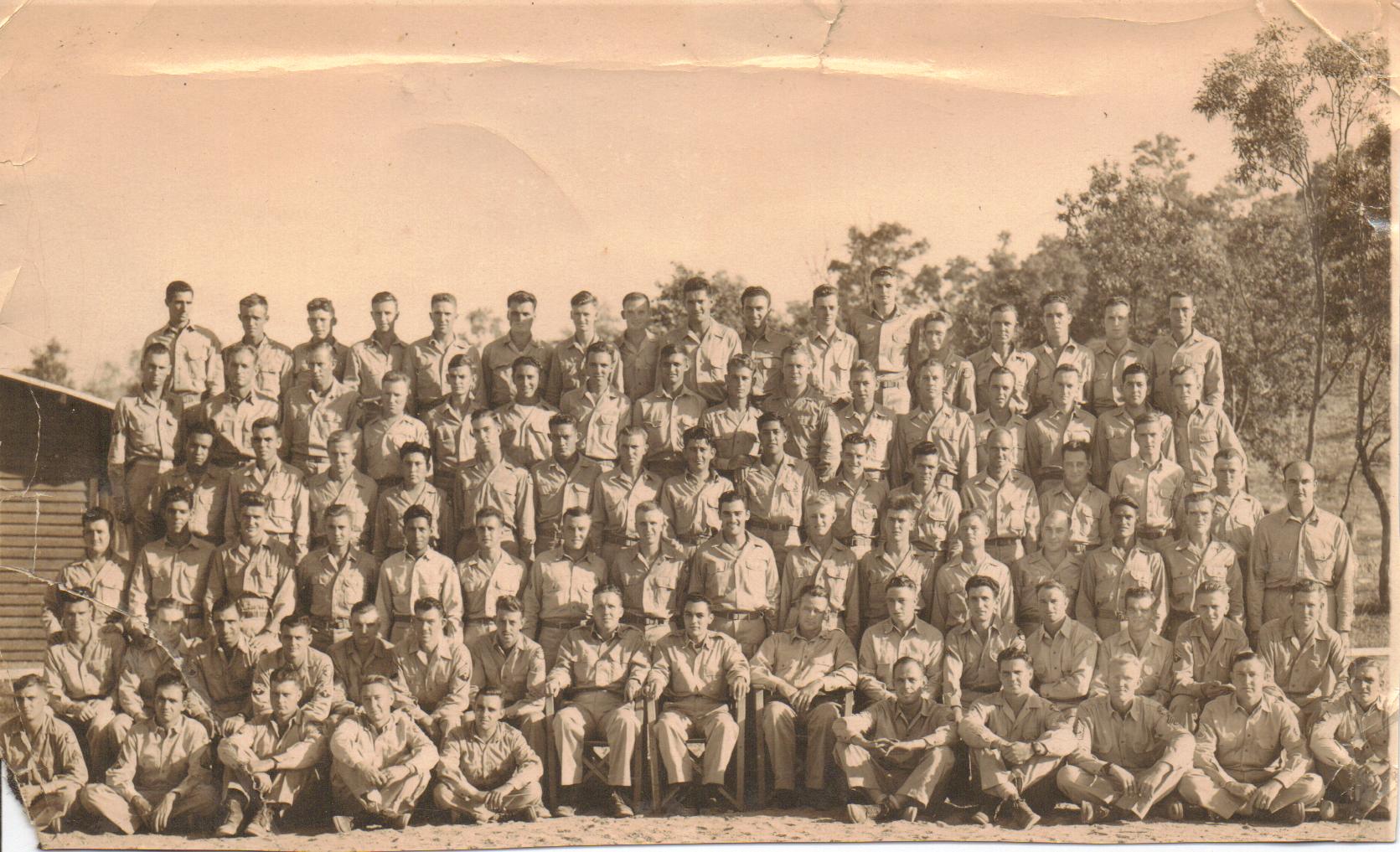
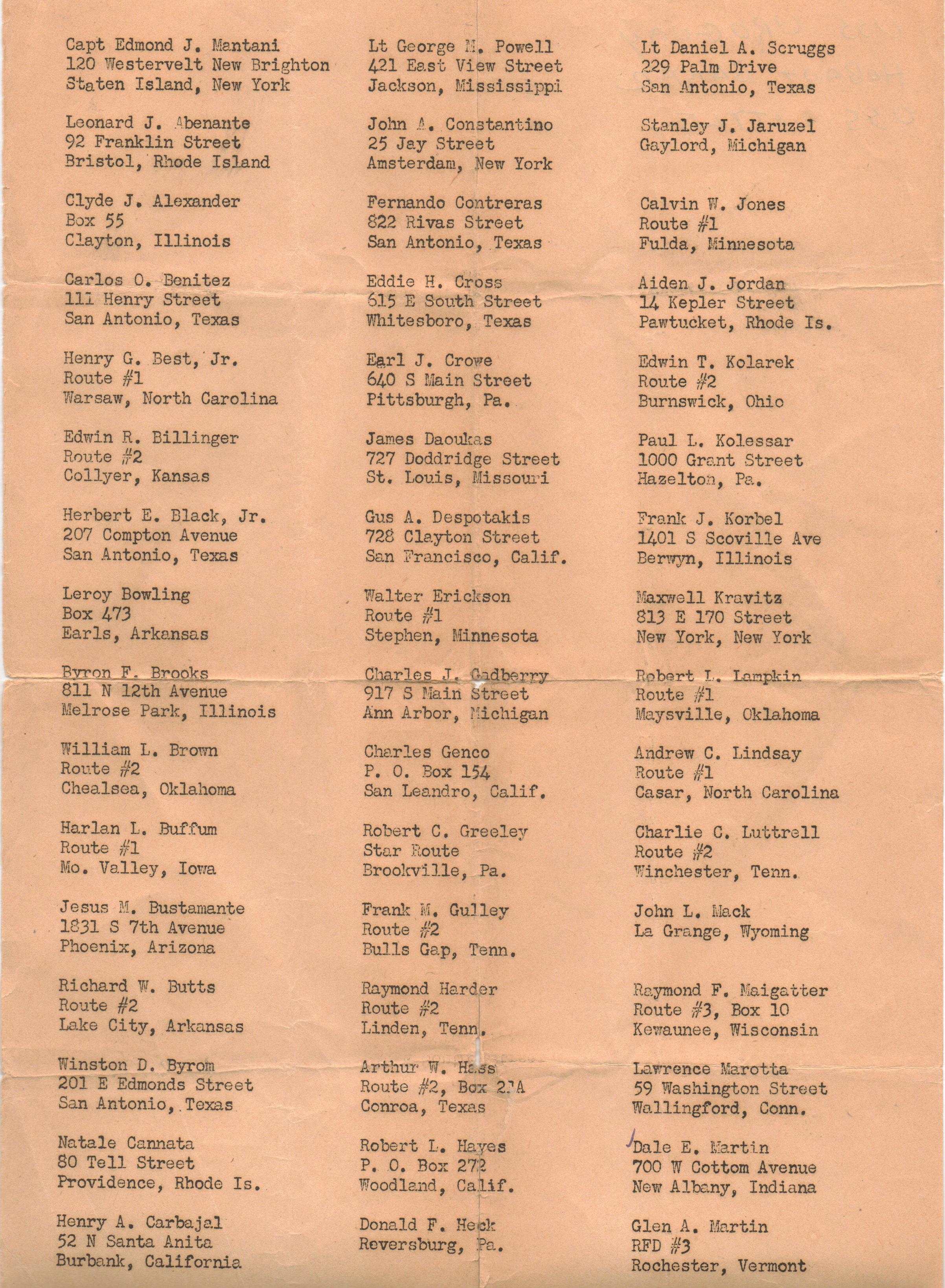
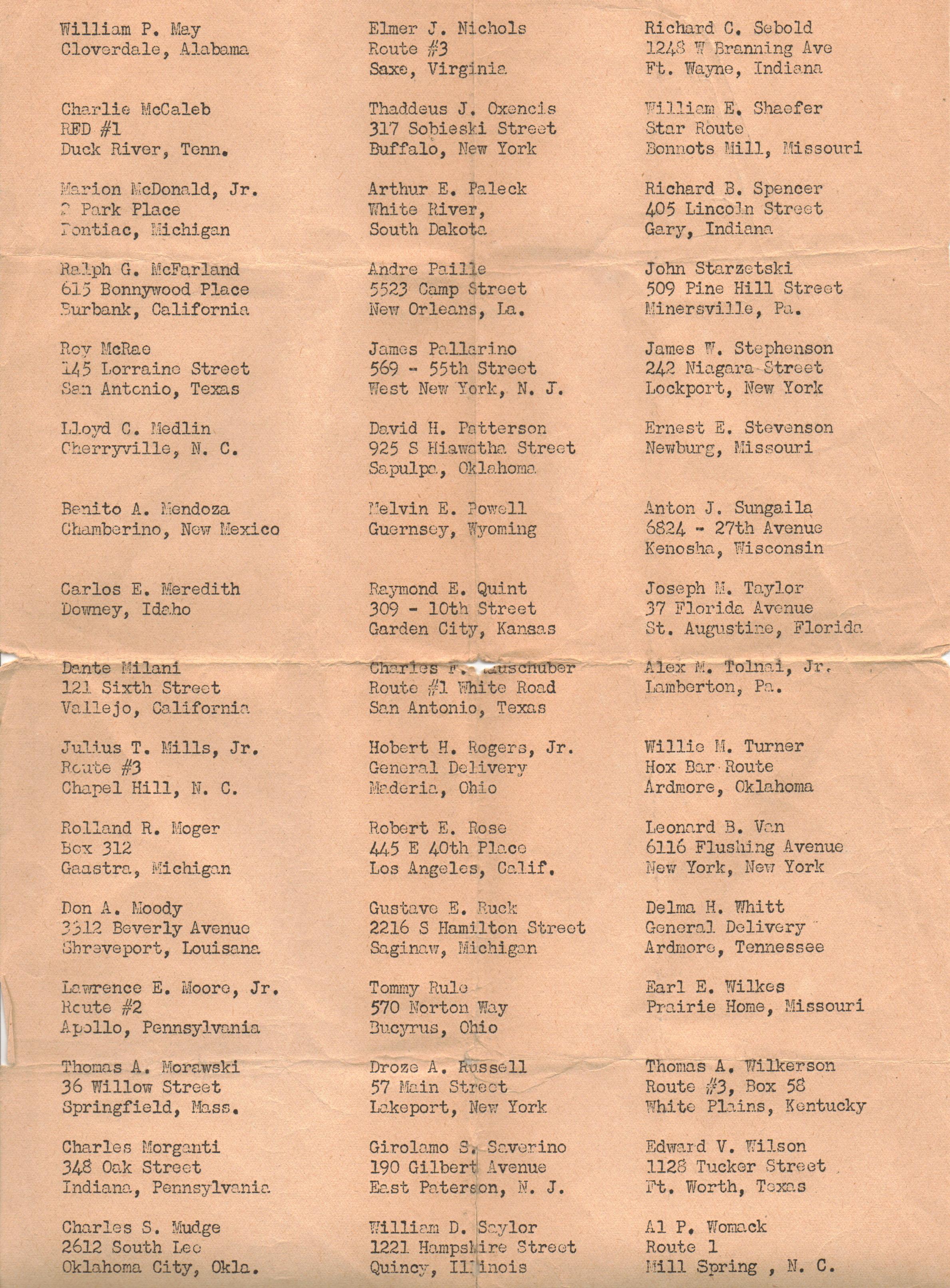
When you were driving did you ever have any close calls?
Oh, yeah…we didn’t have any lights on the truck see we had these strips those reflective strips and you couldn’t see them past 50 feet so you see that was night time drivin’... and oh yeah we got hit quite a few times.
Did you ever see anybody, I mean close to you?
Oh you mean get killed? There were guys I knew but we never knew what happened but no I didn’t see anyone but when we were goin' to front lines there was this one guy and his insides were hangin’ out. but see, the ambulances couldn’t get through there because it was to deep with mud so they used us, they put mattresses on the truck with our supplies and we would haul these guys back and we talked to the medics and they loaded the mattress but at first we didn’t know why they was puttin them matresses on the truck of course later we found out why but anyways, I told that medic what about pain cause this is rough ridin’ it was about a mile and ½ that was a single road and sometimes we would sleep in the truck and…and the MP would wake you up and then you could go through and I told that medic you better have something for them boys because gosh almighty they was moanin’ and he said oh yeah I have morphine and I said okay before we got to that area I’ll stop and you give ‘em all a shot…they need it because that was 45 minutes of goin’ through all that…so we’d stop and they all got morphine and we would go through…it was, you know, you drove in mud you ate in mud and you slept in mud…that was what we had…boy, I was so glad when I got out…haha…
What was the food like?
Oh uh crap! That was nasty…C-rations that’s what they were called…a piece of cooked beef covered with lard…uh…eew nasty…and 2 hard biscuits and a bar of candy…4 inches by 2 inches by ¾ inches thick…we would take the candy out and throw the rest out…haha (laughing)
But you never got real meals?
No, no, no…oh no…uh I didn’t get milk until I got back.
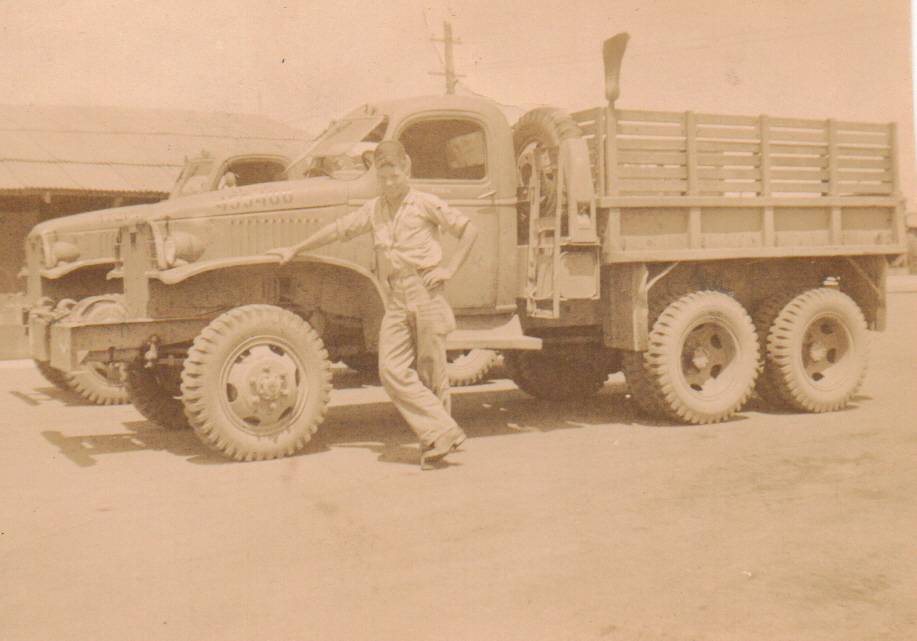
Oh no, I said did you ever get real meals?
Oh no…they had a big tent and you could go through the tent but see the Australians furnished the meat and it was mainly mutton…they would make that mutton shlop and I would throw it out…you couldn’t eat that crap, but we did okay…I guess we did pretty good.
What were the living quarters like?
We had tents but well a lot of times we slept in the truck. Sometimes because it would take 1 full day and 1 night to get from the front lines and back. We slept where we could another words, some trucks had tarps on them because of the ammunition cause it couldn’t get wet or it would misfire. But we slept wherever we could they had a great big tent for us and would just lay down and we was wet, all wet, you ever been wet where you get wrinkly? It was like that you know and you pretty much stayed like that. See there was no days for us you know sometimes you’d realize its Sunday and you were allowed in any church you found and you would bow your head and forgive your sins and then you’d go on. You see that's war.
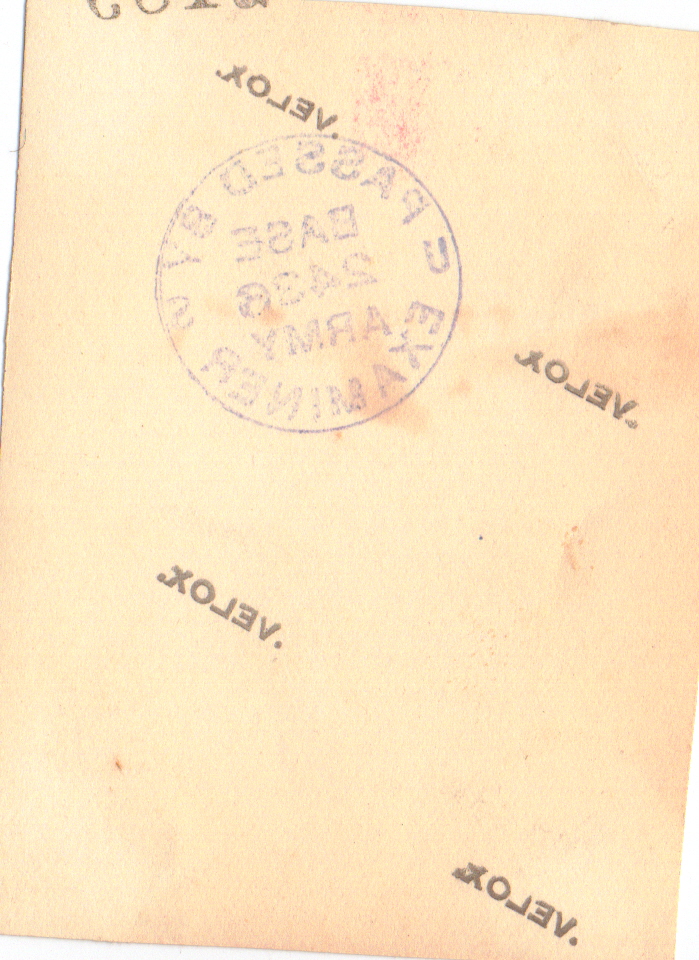
Did you write letters home?
Oh yeah…I wrote letters to the family.
Do you remember what you wrote about?
Oh no you couldn’t say anything because if you said anything about the war they blacked it out even the pictures if you look at the back they stamped them, they had to be passed yeah…it was like that it was hard.
Did you have any souvenirs?
Yeah…Jap gold caps off their teeth. I had a jar with alcohol in it and a pair of pliers and when I found a dead one I would pull the teeth out and put them in a jar…so somehow uh the commanding officer he found out and uh he came up to me and said he heard that someone in this outfit is takin’ gold teeth and he pretended he didn’t know it was me because he would have to turn me in and he uh said you tell whoever it is to get rid of ‘em and I said yes sir. Yeah that was the end of that I got rid of ‘em real fast…(laughing) I had a Jap gun too but this Captain took it from me and I know that he kept it that sun of gun. (laughing)
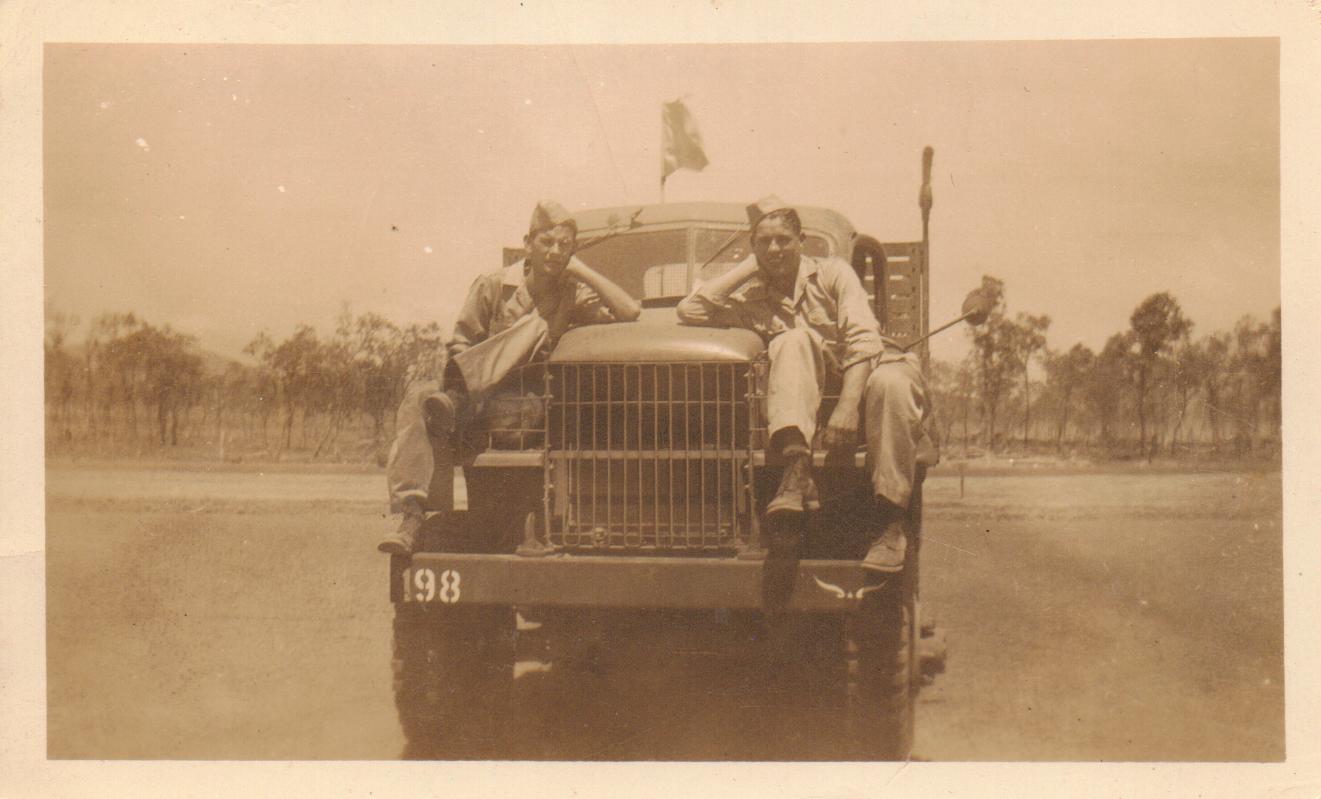
Did you ever come in direct contact with enemy soldiers?
No, we was in well I mean I saw them at a distance but not face to face. Now we opened up on them yeah we had a convoy, in a convoy you usually had a driver and a assistant driver not in all of them but out of 12 trucks there was 4 extra drivers in case someone got shot. And we had them Filipino Guerillas ridin’ shot gun and some would ride on each truck and when they’d see somethin’ they’d yell out and boy they’d shoot one time and go off the trucks and get them Japs you know they was hidin’ you know, why they never shot back I don’t know. I quess they was waitin’ for ammunition and that’s what we had to try and stop was that ammunition and that way if they didn’t have that well then that’s the end of it you know. But one time we went up and I drove 2 nights and one day so we got up to the narrow part where it singled out so I was sleepy so I took of them ponchos under my head and I fell asleep and we heard BOOM you know I said what the hell was that. So after it was all over I jumped in the ditch and the bar ditch was full of water and then over our heads flew a flight of Zeros runnin’ away from our fighters boy I saw them twin P-38's them twin-fussel lodge and I said that’s... by God that our buddies up there…haha…now whether they got ‘em or not I don’t know. But that was the Japs they unloaded on us they had dropped that bomb about 20 or 30 feet from us man that thing went off and I though oh man this is it…haha…I came out of that truck straight into the ditch. But that was another scary thing I had…
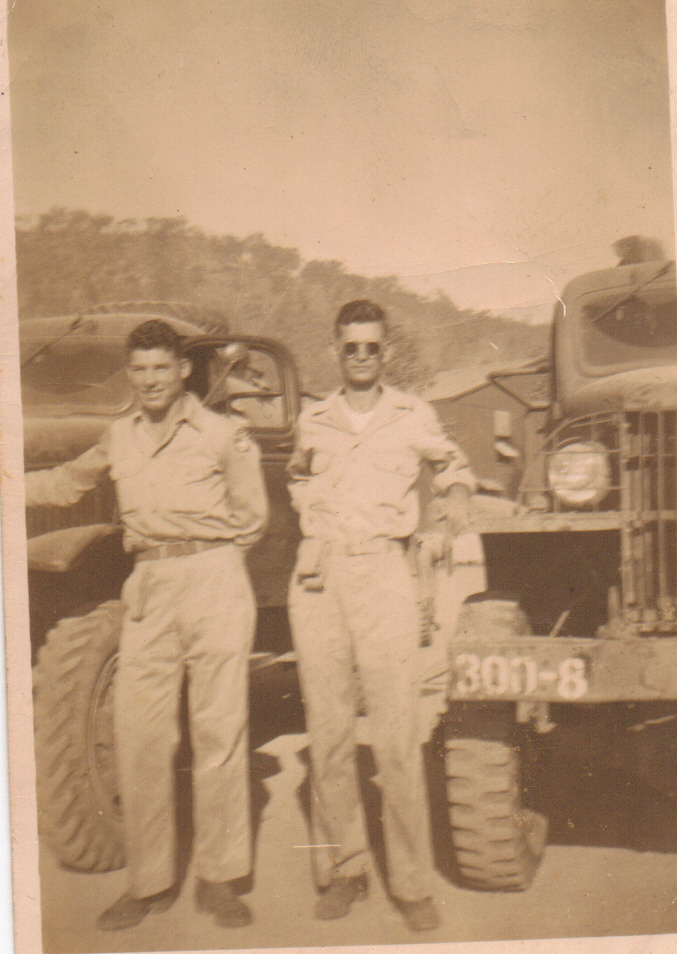
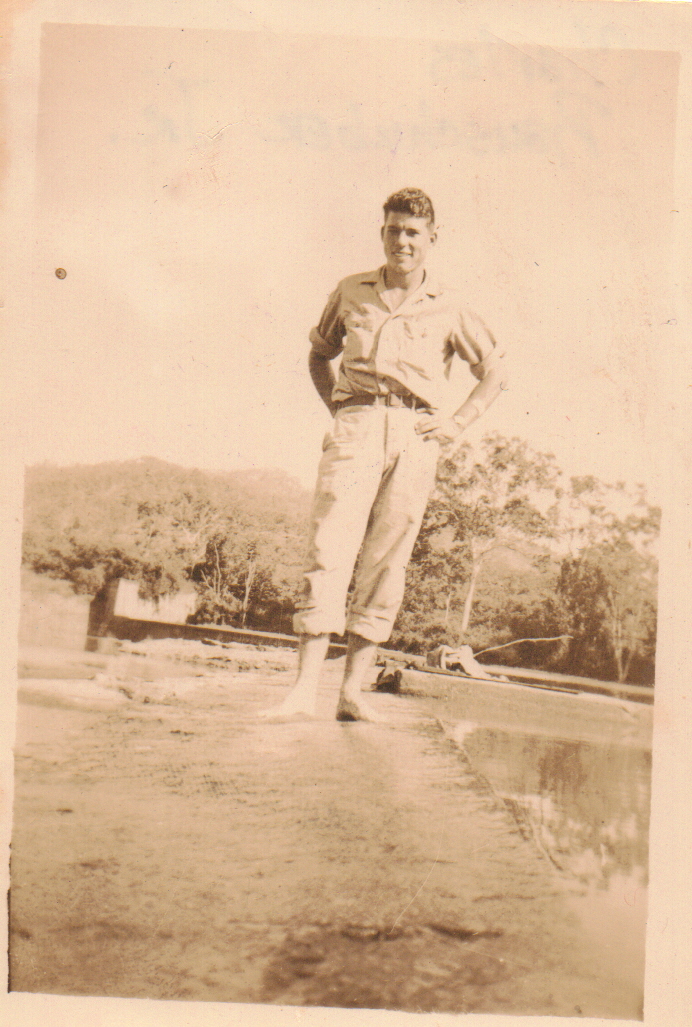
Did you ever go into Prisoner Camps?
Oh yeah, we transported them I called it the South End of the Island they’d have these Filipino guards on them boy they didn’t take no crap from ‘em either man you better shut up or you got the butt end of a gun but anyways, we’d haul them over there and that was nice because you get out of there for a little while and it was a change and at night they had a BBQ for us and the Filipino’s ladies were all around us and my God that was nice…(laughin) but they had us told that to be gentlemen so we did. They had a big place that was temporary for holdin’ them they had ‘em in there we’d haul them prisoners and they’d be tied. I don’t know how they would tie ‘em up but they would tie em' with somethin’ and set ‘em on the boxes and then we’d go to the prisoner camp and they they’d unload ‘em there.
Where were you when they drop the atomic bomb?
I was in the Philippines and we heard it on the armed forces radio that they dropped the bomb on Hiroshima we didn’t know what that was. I mean we said atomic bomb what the hell is that and then we said I don’t know but nobody knew what that was and a couple days later on the armed forces radio we heard they dropped in Nagasaki. Hey we all thought what is that you know because we never thought of nothin’ like that but see we were all ready to go we had got shots and hair cuts and our teeth cleaned and everything and we was headed for Japan. Oh yeah but we didn’t know that then and we had found that out later…(long pause)…you know it was a couple days later that we heard Japan surrendered boy I tell you that there was happiness. Oh my gosh that there was one of the happiest days I had.
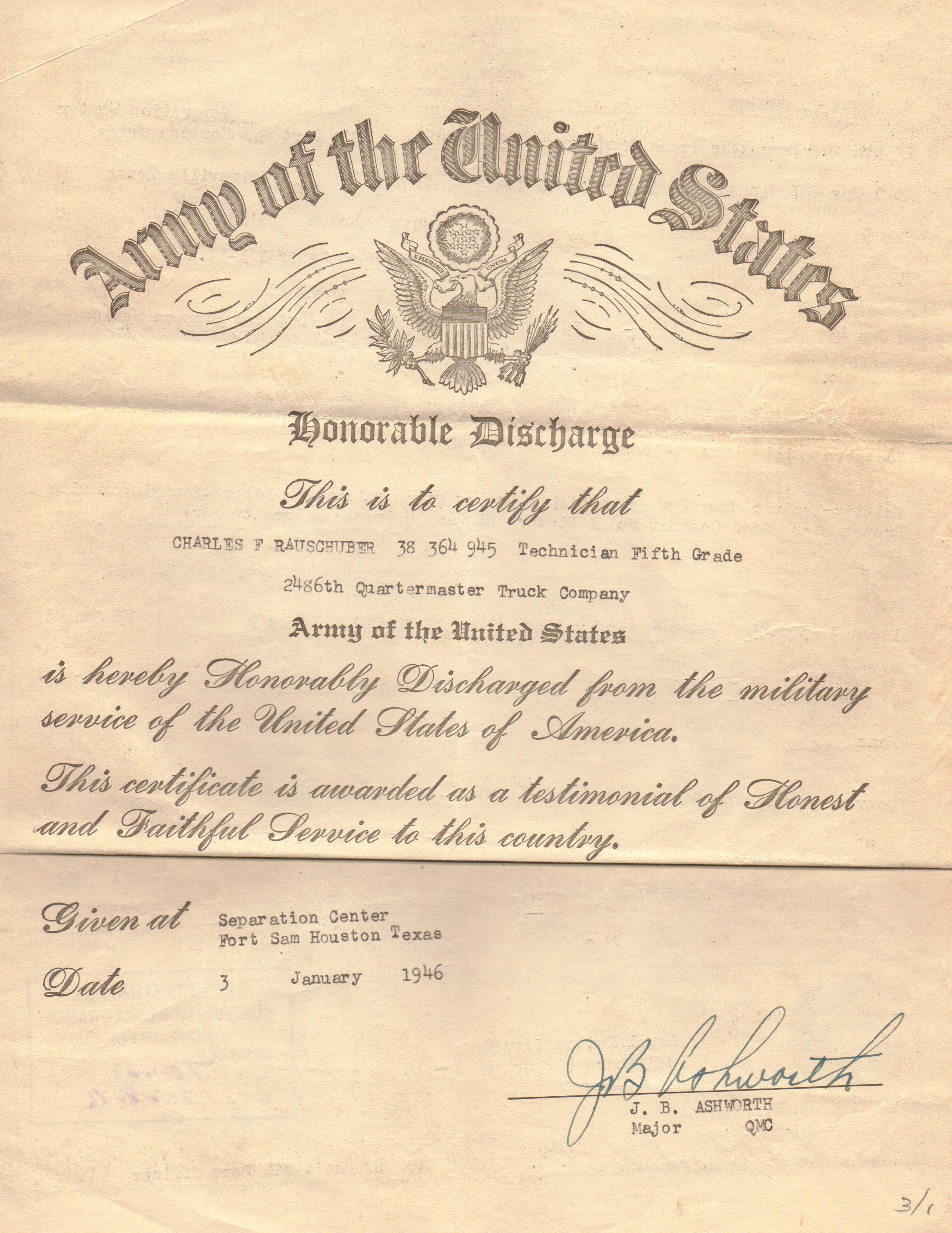
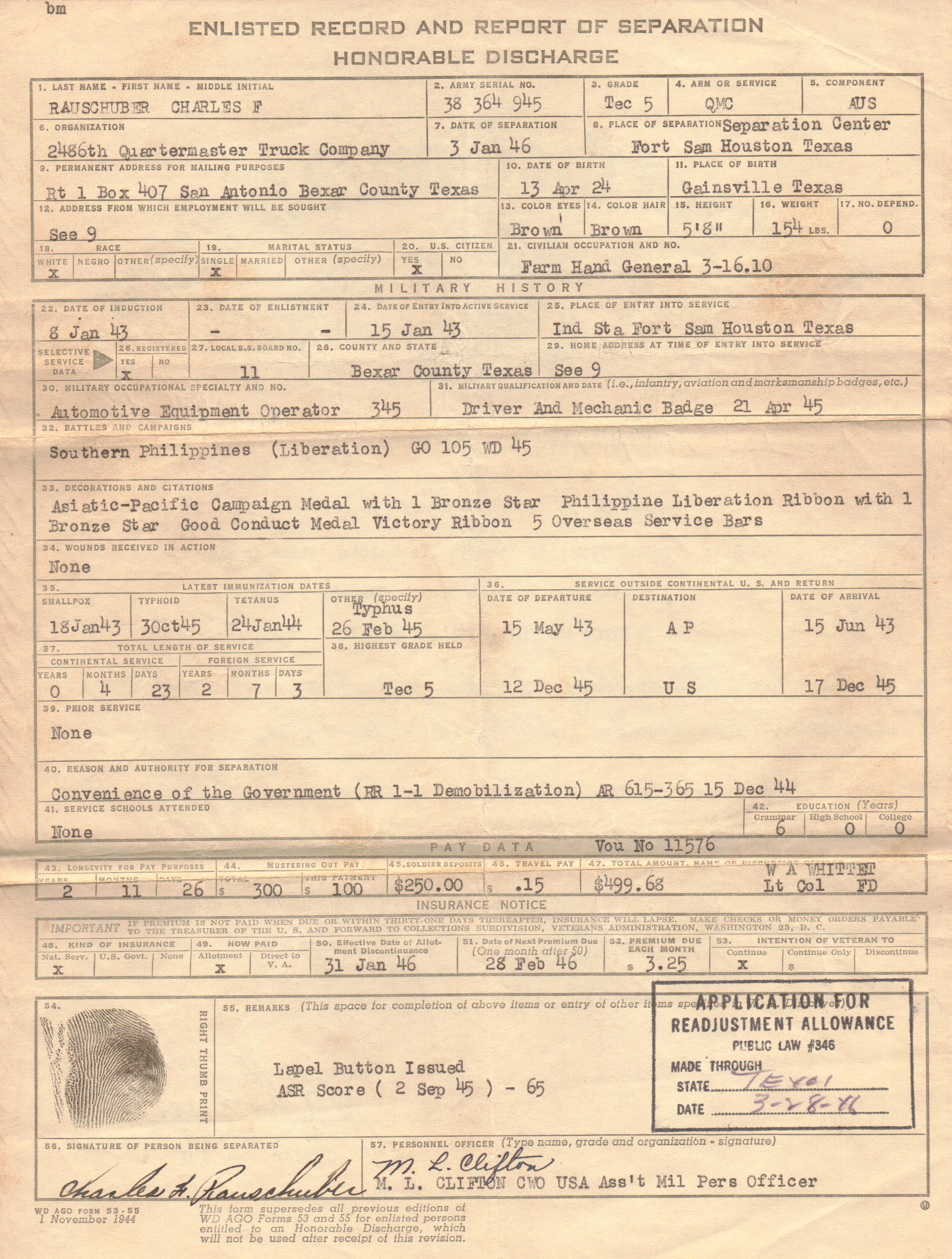
How much money did they give you when you got out?
300 musterin’ out and they gave us 50 cents for taxi, but I caught a bus out at Dodge Field that transferred to San Antone and into Rigsby because there was no bus to go that far out and so I was carrying my duffle bag and a guy pulled over and I walked over and it was Raymond Willinbrook and his wife and he said "Charlie what are you doin’"and I said I’m goin’ home and he said "I know where you live I’ll take you out there" and so I went home…
What was your route back here?
You mean back home oh, we went to camp Soman and took a train back to Texas and the Porter, the cart guy he said "Hey you guys want somethin’ to drink"and we said "oh yeah" so we all pitched in 2 dollars apiece and he went somewhere and then when he came back he backed up to that train and unloaded that beer. Oh man that was good (laughing) boy that beer was good.
When you got discharged I guess you were happy to see food?
Well, see when we got back I had bleedin’ ulcers and we hit a typhoon on the way back and the captain was worried I was I was hurtin’ real bad for a day or so there…so
( PAUSE)
So when I got back I was in sick bay for 5 or 6 days or so I had an ulcer kickin’ up and the captain put a tube down my throat and he said Charlie it’s green and red blood he said you got a severe case of something and I said ok so then we got to San Francisco we went around over to the Golden Gate and I told that captain I’m gonna walk off this thing I ain’t be carried and he said no soldier you ain’t gonna walk we don’t know what that is Charlie and I said okay and they took me in an ambulance and took me over to Letterman Hospital in San Francisco that was the Army Hospital and I was in there 4 days and then the nurse came in that mornin’ and I said when can I get out of here she said why I said because I’m home sick for Texas and I wanta get on outta here(laughing)and so the captain came in and said you’re from Texas and I said yes sir he says I hear you wanna go I said yes sir I feel real good but I didn’t but I said I did feel good and he said okay so get your stuff together and he took me back to Camp Stoman and some of my buddies were still waitin’ for the train home so then I went down to the office I said I just got out the hospital at Letterman could you put me with my gang and she said yes sir but anyways, we had Christmas dinner at Camp Stoman with German prisoners…well they weren’t prisoners no more because their war was over but that food. Oh let me tell you that was food boy turkey dressing everything went with it and I had 4 cups of milk, that was good…umm…milk…(laughing).
When you got out how did you feel toward the war and President?
I felt good…we won and I felt we’d done our job. You know when I got out I joined the Veterans of Foreign Wars but you know after a while it’s all behind you and you have to try to move on. There are a lot of things I don’t remember because I was there 2 years and 6 months and a lot happened. Sometimes it better to try and forget but at least we got to come home to a good country cause we weren’t the only ones that won the war. You know I just had to let something’s go…

How did you feel when you got home?
Emotional…we was all emotional. Well see this is the funny thing that happened when we got on the ship in the Philippines there was about 7 or 8 of us together in the same outfit and (long pause) you could hear the prop hittin’ the water and I mean everybody looked down like that and then we looked up at one another and just started huggin’ one another and thought to ourselves we is goin’ home but our buddies are stayin’ here. That there was emotional I tell you it still makes me hurt you know it just makes tears in my eyes still just to think about it. It’s hard to do you know to wonder why did we get out and they didn’t but you know that’s law it’s just the way it is…(long pause)…
Were you happy to be home?
Whew, oh boy yeah…boy let me tell you…
I bet your mom was happy to see you…
Oh yeah she said "every night I prayed for you boys" and see Leonard was a Combat Engineer in Europe and Walter was in the Navy and I was in the South Pacific and we all came back and nobody got hurt so she got lucky and she said it was the prayer that done it. Haha…
Oh man I hugged her though…
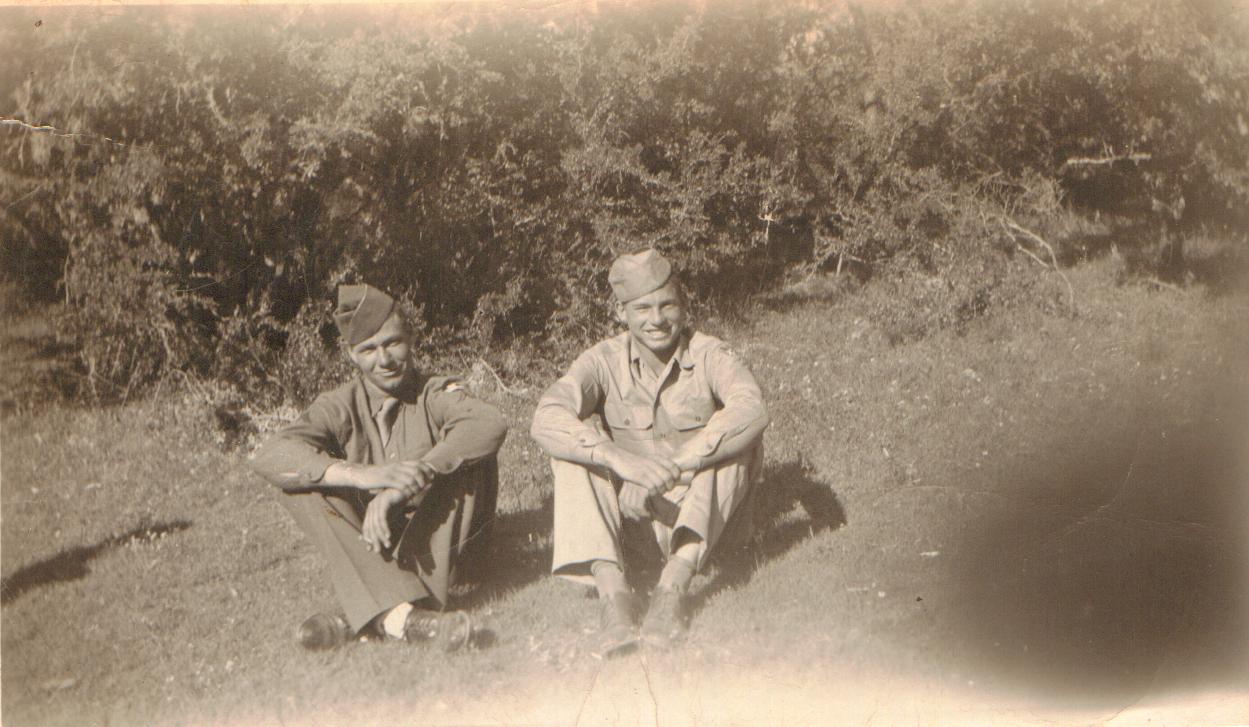
Where did you go when you got home?
When I got home I went to Brook General …it Brooks Army Medical Center (BAMC) now. I had them bleedin’ ulcers so I stayed there 15 days and then I got my discharge and then I had 1 guy from Veterans and Foreign Wars he said I need to talk to you before you leave because your gonna get a disability for this because it’s a life time problem. Shoot I still have it I have to watch what I eat or I’ll get that achin’ you know I was getting’ 50% on that and now every month I get 10% but I wrecked a truck in the Philippines. I had a captain in the front and a GI to the top and this guy pulled out in front of me but he was a new guy out there and he pulled out like in front of me and you know we drove without brakes and then this Filipino girl she had tried to jump on the truck and well that’s about the time I hit him and she flew in the truck and see we had built up the front of the truck so the weight would hold us down and we’d get the traction but any way the boxes fell on me when we wrecked and that captain he said uh Charlie you okay I said no get these boxes off me, they had me pinned into the steering wheel…haha…man. So they asked first what do we do with all this and the captain he uh said push the truck in the ditch and they did I didn’t I was hurtin’ so they took me to 44th General that there was a big tent and they made me stay that night and they took x-rays and that was about it. And when you get out you gotta tell them everything that hurts you and I told them I wrecked that truck and I did was hurtin’ really…I was hurtin’. So they put it down but in 1998 when I was workin’ in Las Vegas, Nevada I had my back hurtin’ so bad so I said I’m goin’ to the VA in Hendris…it was about 10 miles or so from Las Vegas and they said oh no you ain’t got no record of your back. All you got is the stomach trouble and I said no I wrecked a truck he said no, no, no I don’t know nothin’ about that and we had been livin’ in Del Rio later and this gentleman was livin’ by us and we would talk about Army stuff and uh…I told him that our records were destroyed by a fire in St. Louis he said "Oh hell no they burned them" I said your kiddin’ me…he said "Oh no sir I was there I had nothin’ to with that though but they burned our records to make it easy." So I have no record on my back so for 60 somethin’ years with a back ache.
but well that’s the way they are…
Did you use the G.I. Bill?
Yeah that’s how I went to Southwest Electrical Institute was on that there GI Bill but I didn’t finish…I didn’t go through the whole thing. I had that truck and was drivin’ at night and goin’ to school during the day and I said I couldn’t make it and I couldn’t tolerate it.
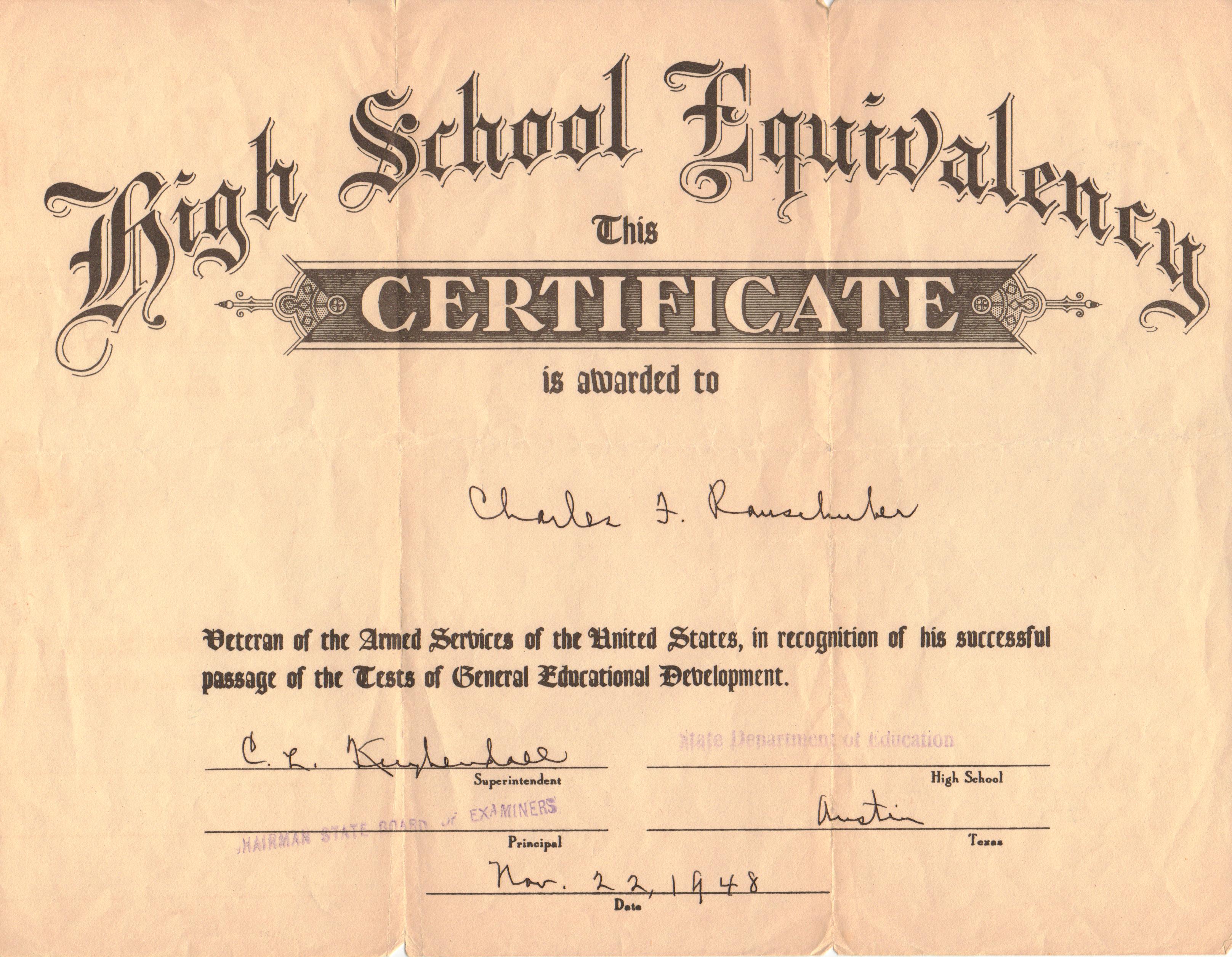
When you got home what did you do?
I went to Kelly Field to work in instrument repair see I was workin’ there at 16 years old well they put me in El timidor and couldn’t handle that…I said no, no so I went to Bank and turner and rate of speed and I got real good at that…okay when I went through there I was getting’ 90 cents an hour and I met2 guys that took the instruments out of the planes but they was in a different field and they said you can get your old job back but you gotta go to Oklahoma…and I said oh no oh…uh…I ain’t leavin’ home again but anyway they gave me a big truck to run around on base and there was uh a lieutenant well he was supposed to be but he wore civilian clothes and I told him and told him so I said hey wait a minute these guys are getting’ $1.25 and I’m getting’ 90 cents and I served my country and so he said Charlie I’m gonna see what I can do with it and 2 weeks later I went back and he said oh I was so busy I couldn’t get to it so I said okay. I gave him another week and he said I was still too busy so I was fightin’ mad…I said you SOB come outside…I’ll fix you up. I was hard up and ready to go…I had that fightin’ blood in me…(laughing). But anyways, I got mad and my dad he was at West Kelly and uh he did Salvage and I got in my truck and drove over there…I got there and he said Charlie what are you doin’ here and I said I quit he said why and I said because them guys didn’t serve one day in the Army and I served 3 years in that hell hole and they get $1.25 and I get 90 cents…hell no. He said did you fight it I said yeah that lieutenant was supposed to take care of the ex GI’s…I said so don’t pick me up…I’m goin’ to the bus and I caught a bus to East Commerce Street where my uncle had a tire shop…it was uh San Antonio Tire Company and he was in truckin’ during the war. So I got there and he said Charlie what are you doin’ here and he hugged me…he said lets go get a beer…went to the little bar called Russ’ across the street and he said you ain’t payin nothin’ oh no…haha…he said Charlie what are you doin’ and I said well I quit Kelly Field and he said what are you gonna do and I said I’m gonna get me a truck and he said wait a minute…he said I’ll take you but I don’t remember the name of the truck company but anyways…he said I’ll get you the same rates as a fleet…I said good so I got me a truck…it was a 1948 F-8 Ford…it was green (they only came green) and he gave me a trailer for $400 with new tires and new brakes and I said you got a deal (laughing).
Do you remember how much you paid for the truck?
Uh…$3800 oh yeah that was by big money then. So I went to truckin’ after that…
When did you meet Betty?
I was 24 and she was 23 and I saw her across the street and I said what the hell is wrong with me…I’m goin’ to talk to that woman and boy I liked her, she was beautiful you know she was it. And we was married 54 years we didn’t have no kids though cause she had 3 miscarriages and the doctor called while I was in Tucson, Arizona and he called me in there with her and he said no more the next one could kill her and I said no, no, no so she took care of that.
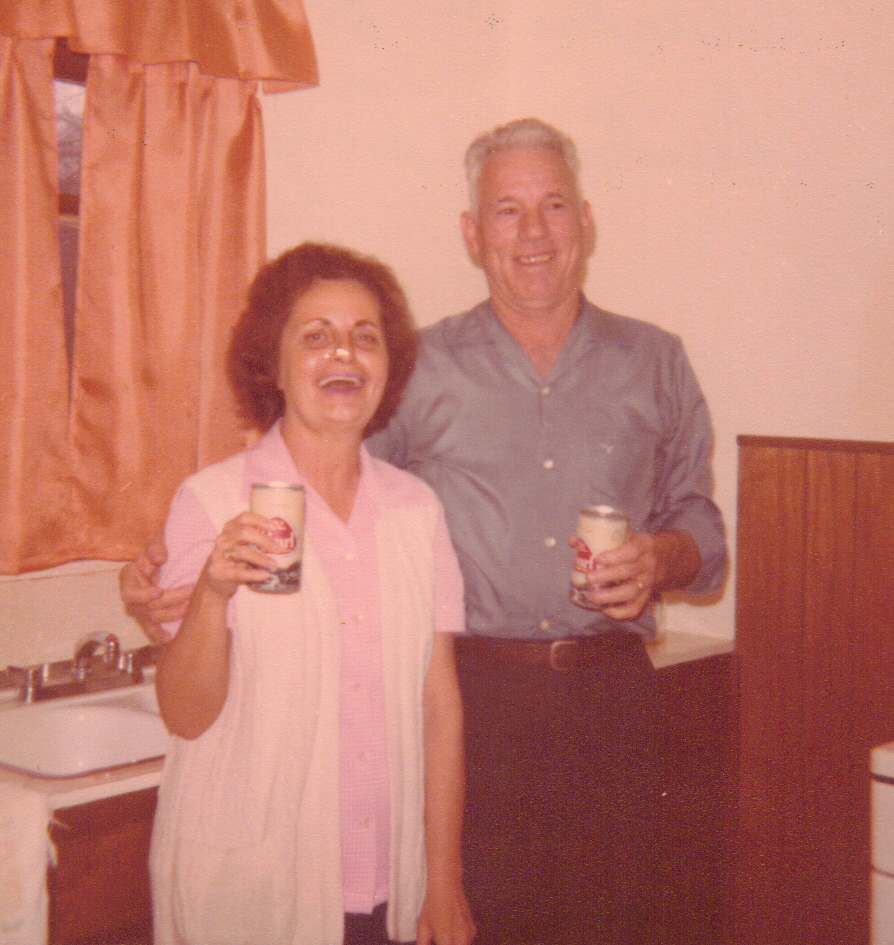
What’s your fondest memory?
Oh my fondest memory was the day I married my wife the second best was when they told me that the Japs had surrendered that there was a lot of relief…oh gosh, yeah.
Do you have regrets?
No…well maybe that we never had any children you know her and I were so close I guess you get that way when you don’t have any children when you just give all your love to her and she does the same. See some guys they stop and have a beer after work and I said oh no if I want a beer I go get one with her. I treated her like a queen and she treated me like a king…(laughing)…but gosh I miss that girl.
Is there anything else you would like to add to this interview?
No, I think I told you everything but I do know this I was sure happy when it was over, boy when it was over that was relief you know you don’t think of life and you don’t make too many buddies but I had this one, John L Mack…he was from Wyoming he was a real sheep herder and it was interesting to talk to him he was the best soldier you know the only thing with him was he could not stand the inspections and you know if one guy failed the whole bunch of us get in trouble…(laughing).
But I don’t think there is nothing else…I let you know how they treat a GI and that just ain’t right not at all…
